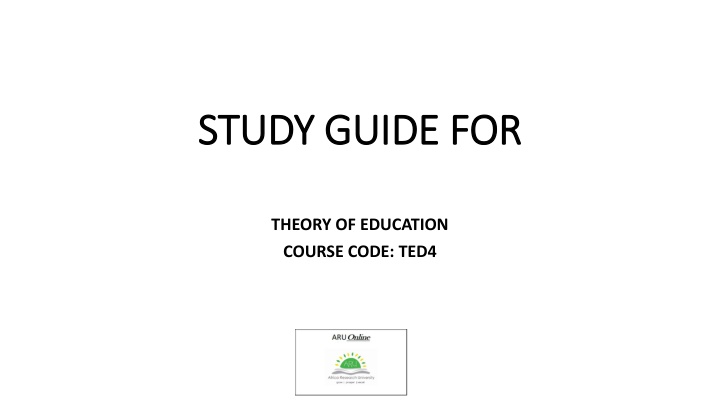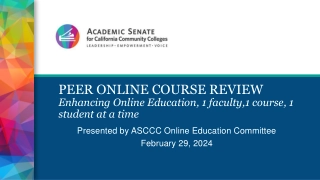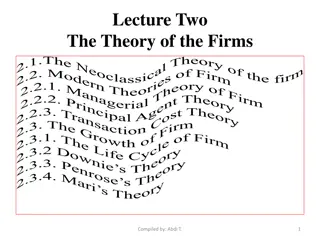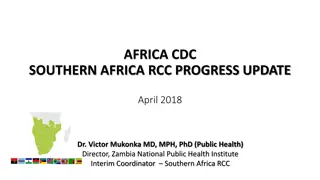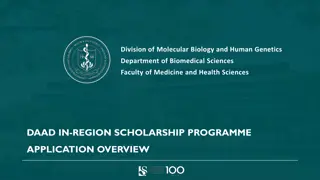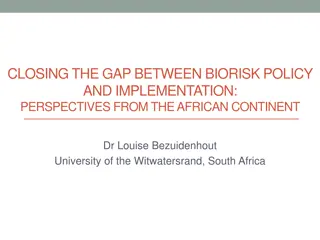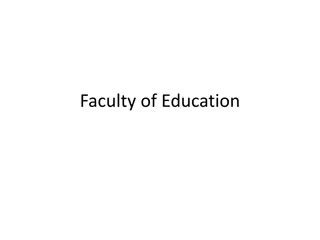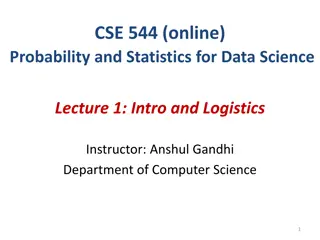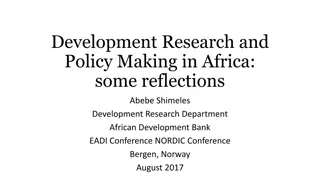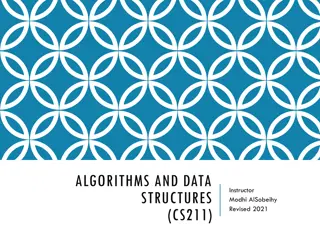Study Guide for Theory of Education Course at Africa Research University
Explore the basic theories of education in this comprehensive study guide for the TED4 course at Africa Research University. Delve into Didactic Perspectives, Psycho-pedagogic Perspectives, Sociological Perspectives, Historic and Comparative Perspectives, and Philosophical Perspectives. Enhance your understanding of teaching and learning concepts through a variety of educational perspectives.
Download Presentation

Please find below an Image/Link to download the presentation.
The content on the website is provided AS IS for your information and personal use only. It may not be sold, licensed, or shared on other websites without obtaining consent from the author.If you encounter any issues during the download, it is possible that the publisher has removed the file from their server.
You are allowed to download the files provided on this website for personal or commercial use, subject to the condition that they are used lawfully. All files are the property of their respective owners.
The content on the website is provided AS IS for your information and personal use only. It may not be sold, licensed, or shared on other websites without obtaining consent from the author.
E N D
Presentation Transcript
STUDY GUIDE FOR STUDY GUIDE FOR THEORY OF EDUCATION COURSE CODE: TED4
1. COURSE INTRODUCTION AND OVERVIEW 1.1 Welcome to Africa Research University (ARU)! It is with great pleasure that I welcome you to ARU! You are now part of a special group of people a group that looks into the future and sees the sun rising! This is the group of ARU Zambia students working towards their successful future. Yes, our motto is Growth Prosper Excel. That is what I wish for you that you may do well in your studies and future work life through me and my faithful team. ARU endeavours to facilitate strong research-based tertiary education. My intention is to strengthen our students not only in their academic foundation, but also to enable each student to be able to adapt to the present and future global environment. This study guide will assist you in understanding the structure of your module. Start studying early and do your very best. May the sun rise on you! Warm Regards, Prof. Dr. Jakobus Malan ARU Vice-Chancellor
1.2.Introduction to the course This module provides and introduction to the basic theories of education. Over the past century, educational psychologists and researchers have posited many theories to explain how individuals acquire, organize and deploy skills and knowledge. To understand the concept Didactic Principles it is necessary to clarify the term Didactics. The term "didactics" comes from the original Greek word "didaskein" which means to teach, to present or to transfer content. Didactics is thus the science which studies teaching and learning. Education has always been awash with new ideas about learning and teaching. Teachers and administrators are regularly bombarded with suggestions for reform. They are asked to use new curricula, new teaching strategies, and new assessments. This module will specifically focus on the various perspectives relating to education that shapes the world of teaching today.
1.3: Course overview A: Didactic perspectives B: Psycho-pedagogic perspectives C: Sociological perspectives D: Historic and comparative perspectives E: Philosophical perspectives
2. 2. GENERAL INFORMATION GENERAL INFORMATION 2.1 Communication with your lecturer The communication with the University takes place through the Registrar. The contact details are as follows:
Postal address Africa Research University P.O. Box FW 20 Lusaka Physical address Suite 28 Carousel Centre Lusaka Telephone numbers Registrar: +260 95 5 885 672 Student whatsap: +260 96 2 541 331 Student support : +260 97 1 248 101 registrar@aru-online.com office@aru-online.com Email
2.2: Study material 2.2.1: Study pack For successful completion of this module, you should ensure that you have received the following: A study guide Reading material An assessment page 2.2.2: Prescribed textbook The prescribed textbook for this course is The reader consists of Theory of Education learning book, which is supplemented with three articles at the end of the reader. These articles focus on learning theories. The articles are the following: Article 1: A theory of education: meaningful learning underlies the constructive integration of thinking, feeling and acting leading to empowerment for commitment and responsibility (To be used in Study Unit 4) Article 2: Learning theories (To be used in Study Unit 4) Article 3: Theories of learning and teaching: What do they mean for educators? (to be used in Study Unit 5) 2.2.3: Errors, omissions and discrepancies The ARU team prides itself in taking special care to prove our students with high quality study materials. Should you notice errors, omissions or discrepancies, please inform the Registrar timeously.
2.3: Proposed study schedule This course has been divided into eight study units an eight-week program. ARU recommends that this program is followed and that you don t fall behind. You have to apply a great deal of self-discipline, otherwise you may be unprepared for the examination.
Week Study unit SU 1 Section Topic 1 1. Teaching principles A: Didactic perspectives 2 SU 2 1. Teaching strategies A: Didactic perspectives 2. Curriculation teaching strategies 3. Alternative assessment techniques 1. Learning theory approach 3 B: Psycho-pedagogic perspectives SU 3 2. Principles and models of cognitive learning 1. Meaningful learning 4 SU 4 Article 1: A theory of education: meaningful learning underlies the constructive integration of thinking, feeling, and acting empowerment for commitment and responsibility 2. Learning theories leading to Article 2: Learning theories
5 SU 5 1. Learning theories and teaching Article 3: Learning theories and teaching what do they mean for educators B: Psycho-pedagogic perspectives 6 SU 6 1. Problem solving and creativity 2. Theories of development C: Sociological perspectives 3. Sociological perspective 4. The school in question 5. Education and economic development 6. Education for a multicultural society 1. Comparative perspectives 7 SU 7 D: Historic and comparative perspectives E: Philosophical perspectives 8 SU 8 1. Educational institutions: their role and function 2. Concepts in education 3. The education situation 4. Education theories
3. COURSE ASSESSMENT METHOD 3.1: Course requirements Students are expected to timeously submit two assignments and write one examination. 3.2: Assignments Your module is administered by the Registrar. You must make sure that you submit the assignment, together with the assignment cover before the deadline indicated in the annual timetable. Assignments may change from year to year and the Registrar s office will be able to provide information on the latest assignments where needed. If you have missed this date, contact the Registrar for a current assignment. Once your assignment has been received by the Registrar, it is forwarded to the lecturer for assessment. The assessed assignment mark is captured, and the assignment is returned to you. If you have any questions, you can arrange to contact your lecturer through the Registrar s office.
3.3: Examinations It is your responsibility to ensure that you know when the examinations are scheduled and submit your assignments in time. Students gain access to the examination through the completion of all the assignments, pre-registering to write a module and by ensuring that their records with the faculty are up to date. Your final mark for this course is compiled as follows: Assignments:100 marks Exam :100 marks Total : 200 marks
4. 4. BREAKDOWN OF STUDY BREAKDOWN OF STUDY U UNITS NITS Instructions: Each slide contains one module, with self-assessment exercises Download your module onto your electronic device and read it first. You can download your module by clicking on this icon in each study unit:
4.1: STUDY UNIT 1 THEME: Section A: Didactic perspectives Unit 1: Teaching principles To understand the concept Didactic Principles, it is necessary to clarify the term Didactics. The term "didactics" comes from the original Greek word "didaskein" which means to teach, to present or to transfer content. Didactics is thus the science which studies teaching and learning. RECOMMENDED READING: Read p. 2-16 of your Module
4.1: STUDY UNIT 1: LEARNING OBJECTIVES LEARNING OBJECTIVES After completion of this chapter, you should be able to: Apply the Principle of Totality practically Know what the advantages and disadvantages are of using the principle of differentiation Identify guidelines for teaching bright and weak groups in the classroom Explain what you understand by integration and how to apply this principle to be able to accommodate differences Indicate how the principle of example can be applied in your subject, identify advantages of example teaching and how you can accommodate differences by using this principle Complete a test by matching phrases in the context to get a better insight into the application of the principle of actualisation Explain the term group teaching and how you would use this principle to accommodate differences in a class situation Discuss advantages of group teaching Discuss the role of the school teacher in team work, debates and class discussion Identify the role of the teacher in applying the principle of individualization in the classroom Apply the principle of purposefulness in lessons based on objectives to accommodate differences in a class identify the use of tests and examinations as forms of evaluation Explain the role of the teacher in applying the principle of perception
4.1: STUDY UNIT 1: SELF QUESTIONS QUESTIONS SELF- -ASSESSMENT ASSESSMENT After studying the appropriate text of the Recommended reading section, summarise each chapter in your own words. Be able to answer the following questions: To motivate a teacher does not only need things such as films, tape recordings, newspapers and clippings, you also need ideas. Do you agree? Justify your answer. Why is it important for the primary school teacher to have a good knowledge of the school's parent community and environment? Is your mother tongue a language you want to cherish and nourish? Give reasons for your answer.
4.2: STUDY UNIT 2 THEME: Section A: Didactic perspectives Unit 2: Teaching strategies RECOMMENDED READING: Read p. 17-22 of your Module
4.2: STUDY UNIT 2: LEARNING OBJECTIVES After completion of this chapter, you should be able to: Analyze and evaluate the different strategies Be able to practically apply them in different teaching situations Apply individualized instruction learning in an educational situation Apply the strategy of experiential learning in lessons Effectively divide classes into groups and successfully apply cooperative learning in your classes
Continuation of study unit 2 Unit 3: Curriculation teaching strategies RECOMMENDED READING: Read p. 23-27 of your Module LEARNING OBJECTIVES After completion of this chapter, you should be able to: Analyze and evaluate these models Practically apply one of these models
Unit 4: Alternative assessment techniques RECOMMENDED READING: Read p. 28-32 of your Module LEARNING OUTCOME After completion of this chapter, you should be able to: Discuss the essence of alternative assessment techniques Explain the use of these techniques in the educational situation Explain how you would implement these techniques in the adult learning situation
4.2: STUDY UNIT 2: SELF-ASSESSMENT QUESTIONS After studying the appropriate text of the Recommended reading section, summarise each chapter in your own words. Complete all the Activities in the Reader for this chapter
4.3: STUDY UNIT 3 THEME: Section B: Psycho-pedagogic perspectives Unit 1: Learning theory approach Psycho pedagogics has the complete psychical life of the child, as embodied in the pedagogical (educational) situation, as its field of research. In order to grasp the psycho -pedagogical view on learning, it is necessary to give a brief explanation of the essence of the psycho pedagogical approach as such. RECOMMENDED READING: Read p. 33-38 of your Module
4.3: STUDY UNIT 3: LEARNING OBJECTIVES After completion of this study unit, you should be able to: Discuss three basic learning theory approaches Explain the use of these learning theories in the educational situation Explain how you would implement these theories in the adult learning situation
Unit 2: Principles and models of cognitive learning RECOMMENDED READING: Read p. 39-44 of your Module
LEARNING OBJECTIVES After completion of this study unit, you should be able to: Discuss two contrasting views on cognitive development Explain characteristics of a theory of instruction you use as a basis when you structure a learning situation for adults Defend your own opinion on cognitive development in adults basing your argument on your own experiences of adult teaching
4.3: STUDY UNIT 3: SELF-ASSESSMENT QUESTIONS After studying the appropriate text of the Recommended reading section, summarise each chapter in your own words. Complete all the Activities in the Reader for this chapter.
4.4: STUDY UNIT 4 THEME: Meaningful learning RECOMMENDED READING: Read p. 1-14 of Article one: A theory of education: meaningful learning underlies the constructive integration of thinking, feeling and acting leading to empowerment for commitment and responsibility (The article is at the back of the reader
4.4: STUDY UNIT 4: LEARNING OBJECTIVES After completion of this study unit, you should be able to: Understand the four elements of learning theory Differentiate between meaningful learning and rote learning Discuss the new model for education
4.4: STUDY UNIT 4:SELF-ASSESSMENT QUESTIONS After studying the appropriate text of the Recommended reading section, summarise each chapter in your own words. Be able to answer the following questions: Describe the new model for education Define knowledge Why is meaningful learning central to human constructive epistemology? Explain the five elements involved in negotiating meanings Indicate the components of the new model for education
THEME: Learning theories RECOMMENDED READING: Read p. 6 -14 of Article two: Learning theories (The article is at the back of the reader.)
LEARNING OBJECTIVES Identify the categories of learning theories Explain the Epistomological beliefs
What are the three experimental approaches related to the study of associationistic learning? Describe the application of the behavioral learning theories Discuss the components of the information - process system and their implication for instruction Indicate the reasons for eclectic approach based on a pragmatist epistemology is appropriate for the design and delivery of on-line instruction
4.5: STUDY UNIT 5 THEME: Learning theories and teaching RECOMMENDED READING Read p. 1 -23 of Article three: Theories of learning and teaching: what do they mean for educators? (The article is at the back of the reader.)
4.5: STUDY UNIT 5: LEARNING OBJECTIVES After completion of this study unit, you should be able to: Tabulate benchmarks for learning and teaching Explain shifts in the theory of education
4.5: STUDY UNIT 5: SELF-ASSESSMENT QUESTIONS After studying the appropriate text of the Recommended reading section, summarise each chapter in your own words. Be able to answer the following questions: Describe learning as a process for active engagement Explain the learner differences as resources, which describe one of the shifts in the theory of education (learning)
4.6: STUDY UNIT 6 THEME: Section B: Psycho-pedagogic perspectives Unit 3: Problem solving and creativity RECOMMENDED READING: Read p. 45-50 of your Module
4.6: STUDY UNIT 6: LEARNING OBJECTIVES After completion of this study unit, you should be able to: Explain the stages in problem solving Identify the characteristics of good problem solvers Train students to solve basic problems Define creativity in your own words Identify characteristics of creative people Encourage students to be creative
Unit 4: Theories of development RECOMMENDED READING: Read p. 51-58 of your Module
LEARNING OBJECTIVES Give a brief outline of Freud's development theory Name and describe the different stages of development according to Freud Discuss Freud's theory in terms of the educational system Define Erikson's theory on the development of personality Describe Erikson's eight stages of development Discuss Erikson's theory in terms of the educational system
4.6: STUDY UNIT 6: SELF-ASSESSMENT QUESTIONS After studying the appropriate text of the Recommended reading section, summarise each chapter in your own words. Complete all the Activities in the Reader for this chapter. Section C: Sociological perspectives This unit has the objective: Look into a more democratic social system, educating for citizenship; Look at schools in Africa and see if they are ready to educate for citizenship; Overview education and eeconomic development; Nurture tolerance for others in a multicultural society and to tolerate their point of view
Continuation of study unit 6 Unit 1: Sociological perspectives RECOMMENDED READING Read p. 59-60 of your Module
LEARNING OBJECTIVES Emphasise the importance of the school as social educator Highlight the school's duty and responsibility to prepare and equip pupils as good, capable and efficient citizens
Unit 2: The school in question RECOMMENDED READING Read p. 61-62 of your Module
LEARNING OBJECTIVES Think critically about African schools Describe what a democratic school should look like Judge whether teachers in the schools are equipped to educate our pupils to be self-thinking, self-reliant, capable and responsible citizens of a democratic society
Unit 3: Education and economic development RECOMMENDED READING Read p. 63-64 of your Module
LEARNING OBJECTIVES Explain the relationship between productivity and education Discuss the concept of non-productive education Describe the production of the wrong type of graduates
Unit 4: Education for a multicultural society RECOMMENDED READING Read p. 65-67 of your Module
LEARNING OBJECTIVES Discuss what education for a multicultural society means and how it must be applied
SELF ASSESSMENT QUESTIONS After studying the appropriate text of the Recommended reading section, summarise each chapter in your own words. Complete all the Activities in the Reader for this chapter.
4.7: STUDY UNIT 7 THEME: Section D: Historic and comparative perspectives Unit 2: Comparative perspectives RECOMMENDED READING: Read p. 74-91 of your Module
